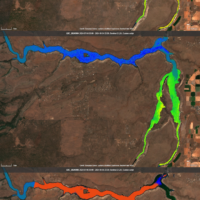
Oregon Health Authority (OHA) issued a preemptive recreational use health advisory today for Lake Billy Chinook and Lake Simtustus, due to the presence and rapid growth of a cyanobacteria harmful algal bloom. The lakes are in Jefferson County.
The decision to issue the preemptive advisory is based on multiple reports from partner agencies and members of the public, and is supported by satellite data showing the extent of the bloom, with day-to-day increases in bloom density (see Appendix A). Tests done at Lake Billy Chinook since 2015 show that blooms in the lakes consistently produce cyanotoxins over OHA’s recreational use values for human and animal exposure. Results of testing in the days to come will either confirm the advisory or allow OHA to lift it.
People should avoid swimming and high-speed water activities, such as water skiing or power boating, in areas of the lakes where blooms are present, as the major route of exposure is ingestion of water. Toxins are not absorbed through the skin. However, those with skin sensitivities may get a puffy red rash.
OHA encourages people to visit Lake Billy Chinook and Lake Simtustus and enjoy activities such as fishing, camping, hiking, biking, picnicking, bird watching, canoeing and kayaking. Boating is safe as long as speeds do not create excessive water spray. Sprays could lead to the risk of inhaling cyanotoxins.
Drinking water
Drinking water directly from areas of the lakes affected by a bloom is especially dangerous. Toxins cannot be removed by boiling, filtering or treating water with camping-style filters. Contact campground management or the local health department with questions about water available at nearby campgrounds or day use areas.
Not all private treatment systems are effective at removing cyanotoxins. People who do not use a well or public water system and draw in-home water directly from an affected area are advised to use an alternative water source.
Children and pets
Children and pets are at increased risk for exposure because of their size and level of activity. Dogs can get extremely ill and even die within minutes to hours of exposure to cyanotoxins by drinking the water, licking their fur, or eating the toxins from floating mats or dried crust along the shore. This is regardless of a recreational use health advisory in place.
Dogs can become ill and die from water intoxication after drinking excessive amounts of water while swimming or fetching objects for long periods of time. Intoxication is a potentially fatal disturbance in brain function resulting from an imbalance of electrolytes in the body. Water intoxication and heat stroke can cause similar symptoms as exposure to cyanotoxins.
Symptoms
Exposure to cyanotoxins can be serious and cause a range of symptoms. Symptoms may be similar to food poisoning such as stomach cramping, diarrhea, nausea and vomiting. Symptoms may also be more serious, such as numbness, tingling, dizziness and shortness of breath. These symptoms may require medical attention.
Dogs can experience weakness, difficulty walking, seizures, lethargy, loss of appetite and more. If a dog exhibits symptoms, veterinary treatment should be sought as quickly as possible.
Fishing
Fish caught from areas where cyanobacteria blooms are present may pose unknown health risks, so OHA recommends not eating fish from those areas. Those who decide to eat the fish should remove fat, skin and organs before cooking or freezing. Toxins are more likely to collect in these tissues. Fillets should also be rinsed with clean water.
For health information or to report an illness, contact OHA at 971-673-0482, or visit OHA’s Cyanobacteria (Harmful Algae) Blooms website.















